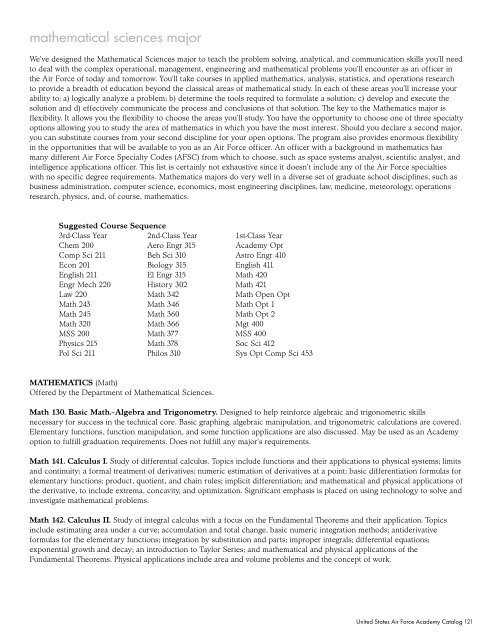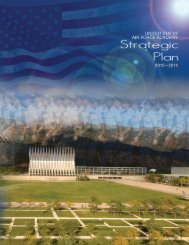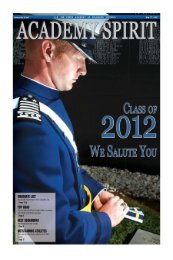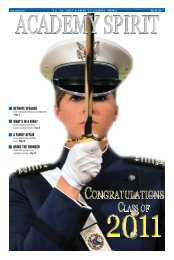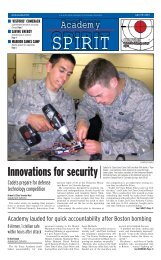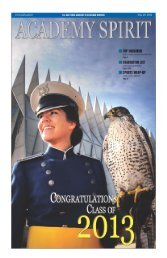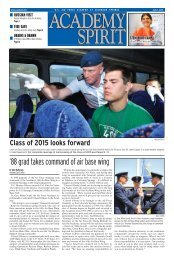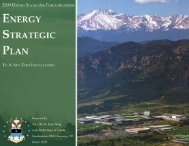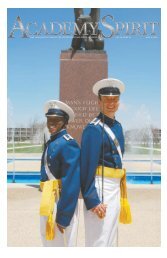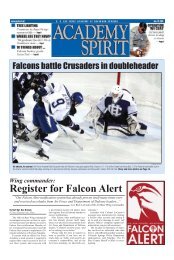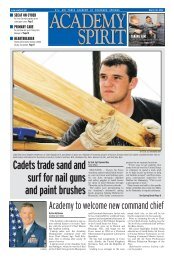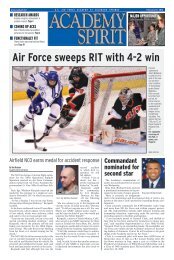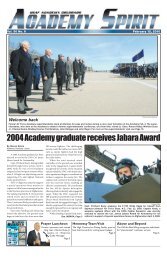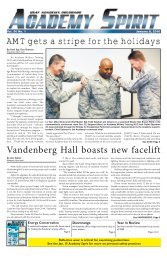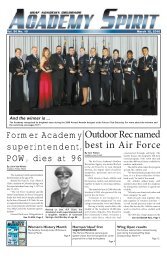2008-2009 Catalog - United States Air Force Academy
2008-2009 Catalog - United States Air Force Academy
2008-2009 Catalog - United States Air Force Academy
Create successful ePaper yourself
Turn your PDF publications into a flip-book with our unique Google optimized e-Paper software.
mathematical sciences major<br />
We’ve designed the Mathematical Sciences major to teach the problem solving, analytical, and communication skills you’ll need<br />
to deal with the complex operational, management, engineering and mathematical problems you’ll encounter as an officer in<br />
the <strong>Air</strong> <strong>Force</strong> of today and tomorrow. You’ll take courses in applied mathematics, analysis, statistics, and operations research<br />
to provide a breadth of education beyond the classical areas of mathematical study. In each of these areas you’ll increase your<br />
ability to: a) logically analyze a problem; b) determine the tools required to formulate a solution; c) develop and execute the<br />
solution and d) effectively communicate the process and conclusions of that solution. The key to the Mathematics major is<br />
flexibility. It allows you the flexibility to choose the areas you’ll study. You have the opportunity to choose one of three specialty<br />
options allowing you to study the area of mathematics in which you have the most interest. Should you declare a second major,<br />
you can substitute courses from your second discipline for your open options. The program also provides enormous flexibility<br />
in the opportunities that will be available to you as an <strong>Air</strong> <strong>Force</strong> officer. An officer with a background in mathematics has<br />
many different <strong>Air</strong> <strong>Force</strong> Specialty Codes (AFSC) from which to choose, such as space systems analyst, scientific analyst, and<br />
intelligence applications officer. This list is certainly not exhaustive since it doesn’t include any of the <strong>Air</strong> <strong>Force</strong> specialties<br />
with no specific degree requirements. Mathematics majors do very well in a diverse set of graduate school disciplines, such as<br />
business administration, computer science, economics, most engineering disciplines, law, medicine, meteorology, operations<br />
research, physics, and, of course, mathematics.<br />
Suggested Course Sequence<br />
3rd-Class Year 2nd-Class Year 1st-Class Year<br />
Chem 200 Aero Engr 315 <strong>Academy</strong> Opt<br />
Comp Sci 211 Beh Sci 310 Astro Engr 410<br />
Econ 201 Biology 315 English 411<br />
English 211 El Engr 315 Math 420<br />
Engr Mech 220 History 302 Math 421<br />
Law 220 Math 342 Math Open Opt<br />
Math 243 Math 346 Math Opt 1<br />
Math 245 Math 360 Math Opt 2<br />
Math 320 Math 366 Mgt 400<br />
MSS 200 Math 377 MSS 400<br />
Physics 215 Math 378 Soc Sci 412<br />
Pol Sci 211 Philos 310 Sys Opt Comp Sci 453<br />
MATHEMATICS (Math)<br />
Offered by the Department of Mathematical Sciences.<br />
Math 130. Basic Math.–Algebra and Trigonometry. Designed to help reinforce algebraic and trigonometric skills<br />
necessary for success in the technical core. Basic graphing, algebraic manipulation, and trigonometric calculations are covered.<br />
Elementary functions, function manipulation, and some function applications are also discussed. May be used as an <strong>Academy</strong><br />
option to fulfill graduation requirements. Does not fulfill any major’s requirements.<br />
Math 141. Calculus I. Study of differential calculus. Topics include functions and their applications to physical systems; limits<br />
and continuity; a formal treatment of derivatives; numeric estimation of derivatives at a point; basic differentiation formulas for<br />
elementary functions; product, quotient, and chain rules; implicit differentiation; and mathematical and physical applications of<br />
the derivative, to include extrema, concavity, and optimization. Significant emphasis is placed on using technology to solve and<br />
investigate mathematical problems.<br />
Math 142. Calculus II. Study of integral calculus with a focus on the Fundamental Theorems and their application. Topics<br />
include estimating area under a curve; accumulation and total change, basic numeric integration methods; antiderivative<br />
formulas for the elementary functions; integration by substitution and parts; improper integrals; differential equations;<br />
exponential growth and decay; an introduction to Taylor Series; and mathematical and physical applications of the<br />
Fundamental Theorems. Physical applications include area and volume problems and the concept of work.<br />
<strong>United</strong> <strong>States</strong> <strong>Air</strong> <strong>Force</strong> <strong>Academy</strong> <strong>Catalog</strong> 121


